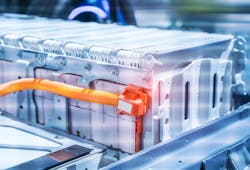DOE Announces $3.5B Grant to Boost Domestic Battery Manufacturing and Processing
As part of President Biden’s Investing in America agenda, the U.S. Department of Energy (DOE) has announced up to $3.5 billion from the Infrastructure Law to lift domestic production of advanced batteries and battery materials nationwide. The funding will also create new, retrofitted, and expanded domestic facilities for battery-grade processed critical minerals, battery precursor materials, battery components, and cell and pack manufacturing.
The investment will also prioritize retaining and creating good-paying union jobs in the manufacturing workforce and will be administered by the DOE’s Office of Manufacturing and Energy Supply Chains (MESC).
This funding supports the Biden-Harris Administration’s efforts to reach a net-zero emissions economy by 2050, have electric vehicles make up half of all new light-duty vehicle sales by 2030, and build a domestic supply chain.
The U.S. is expected to invest in the capacity to develop a resilient supply chain for high-capacity batteries, including non-lithium batteries, as the demand for electric vehicles and stationary storage is anticipated to increase the size of the lithium battery market by five to ten-fold by the end of 2030.
The second phase of $6 billion in total provided by the Bipartisan Infrastructure Law will boost domestic battery manufacturing and supply chains to effectively support the clean energy transition by:
- Ensuring that the U.S. has a competitive battery materials processing industry to supply the North American battery supply chain.
- Expanding the capabilities of the U.S. in advanced battery manufacturing.
- Enhancing national security by reducing the reliance of the U.S. on critical minerals, battery materials, components, and technologies from foreign entities of concern.
- Advancing the domestic processing capacity of minerals necessary for battery materials and advanced batteries.
- Support the goal of 40% overall benefits of certain federal investments flowing to underserved and overburdened communities (in accordance with the Justice40 Initiative).
- Provide workforce opportunities to low- and moderate-income communities.
This phase will promote collective bargaining agreements and/or projects creating a high-quality, high-wage hourly production workforce through the community benefits plans.
The DOE is also working on next-generation technologies and battery chemistries, in addition to lithium-based technologies, which include precursor production and manufacturing for specialized, non-light-duty markets.
The DOE is requesting projects that are intended to increase the separation of battery-grade critical materials, expand production facilities for cathode and anode materials production, and expand battery component manufacturing facilities.
About the Author
EnergyTech Staff
Rod Walton is senior editor for EnergyTech.com. He has spent 17 years covering the energy industry as a newspaper and trade journalist.
Walton formerly was energy writer and business editor at the Tulsa World. Later, he spent six years covering the electricity power sector for Pennwell and Clarion Events. He joined Endeavor and EnergyTech in November 2021.
He can be reached at [email protected].
EnergyTech is focused on the mission critical and large-scale energy users and their sustainability and resiliency goals. These include the commercial and industrial sectors, as well as the military, universities, data centers and microgrids.
Many large-scale energy users such as Fortune 500 companies, and mission-critical users such as military bases, universities, healthcare facilities, public safety and data centers, shifting their energy priorities to reach net-zero carbon goals within the coming decades. These include plans for renewable energy power purchase agreements, but also on-site resiliency projects such as microgrids, combined heat and power, rooftop solar, energy storage, digitalization and building efficiency upgrades.
